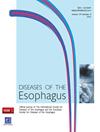622.食管癌机器人辅助微创食管切除术与传统微创食管切除术的比较:一项多机构队列研究
IF 2.3
3区 医学
Q3 GASTROENTEROLOGY & HEPATOLOGY
引用次数: 0
摘要
背景 日本公共保险制度于 2018 年批准了针对食管癌的机器人辅助微创食管切除术(RAMIE)。从那时起,RAMIE 的手术数量逐年增加。然而,就短期和长期疗效而言,RAMIE是否比传统微创食管切除术(MIE)更有益尚不清楚。方法 共纳入2016年至2019年期间在6家机构接受食管切除术的396例可切除食管癌患者(RAMIE,145例;MIE,251例)。为比较短期疗效,进行了倾向得分匹配分析。排除了两期食管切除术、挽救手术和姑息切除术。根据以下 15 个变量计算出个人倾向得分:年龄、性别、体重指数、美国麻醉医师协会身体状况(ASA-PS)、血液透析、口服类固醇、阻塞性肺部疾病、组织学、肿瘤位置、临床 T、N、M 分类、术前治疗、淋巴腺切除范围以及用于重建的器官。结果 对 272 名患者进行了配对分析。RAMIE组手术时间明显更长(629分钟;570分钟,P=0.0005),但失血量(90克;84克)、切除纵隔结节数量(24个;25个)和院内死亡率(1.5%;0.7%)相当。RAMIE组的术后严重发病率(Clavien-Dindo III级或以上)呈下降趋势(18%;27%),喉返神经麻痹显著减少(23%;35%,P=0.046)。RAMIE组和MIE组的5年总生存率和无复发生存率分别为65%和61%[危险比(HR),0.77;95% CI:0.51,1.17],以及61%和51%(HR,0.73;95% CI:0.51,1.06)。结论 RAMIE即使在应用初期也能安全进行。尽管手术时间较长,但RAMIE将是MIE的一个有前途的替代方案,其短期和长期疗效的趋势更好,包括术后喉返神经麻痹的发生率明显降低。本文章由计算机程序翻译,如有差异,请以英文原文为准。
622. COMPARISON OF ROBOT-ASSISTED MINIMALLY INVASIVE ESOPHAGECTOMY WITH CONVENTIONAL MINIMALLY INVASIVE ESOPHAGECTOMY FOR ESOPHAGEAL CANCER: A MULTI-INSTITUTIONAL COHORT STUDY
Background The Japanese public insurance system approved robot-assisted minimally invasive esophagectomy (RAMIE) for esophageal cancer in 2018. Since then, an increasing number of RAMIE has been performed every year. However, it is unclear whether RAMIE is more beneficial than conventional minimally invasive esophagectomy (MIE) in terms of short-term and long-term outcomes. Methods A total of 396 patients (RAMIE, 145; MIE, 251) with resectable esophageal cancer who underwent esophagectomy between 2016 and 2019 at 6 institutions were included. A propensity score matching analysis was performed to compare the short-term outcome. Two-stage esophagectomy, salvage surgery, and palliative resection were excluded. Individual propensity scores were calculated based on the following 15 variables: age, sex, body mass index, American Society of Anesthesiologists Physical Status (ASA-PS), hemodialysis, oral steroid use, obstructive pulmonary disease, histology, tumor location, clinical T, N, M classification, preoperative therapy, field of lymphadenectomy, and organ used for reconstruction. Results After matching 272 patients were analyzed. RAMIE took the significantly longer operating time (629min; 570min, p=0.0005), but the amount of blood loss (90g; 84g), number of harvested mediastinal nodes (24; 25), and in-hospital mortality (1.5%; 0.7%) were comparable. RAMIE group showed a trend of less severe post-operative morbidity (Clavien–Dindo grade III or higher) (18%; 27%) and significant reduction of recurrent laryngeal nerve palsy (23%; 35%, p=0.046). The 5-year overall and relapse-free survival in the RAMIE and MIE groups were 65%; 61% [hazard ratio (HR), 0.77; 95% CI: 0.51, 1.17], and 61%; 51% (HR, 0.73; 95% CI: 0.51, 1.06), respectively. Conclusion RAMIE was safely performed even during the early period of its application. Despite the longer operating time, RAMIE would be a promising alternative to MIE, with a better trend of short- and long-term outcomes, including a significantly lower incidence of postoperative recurrent laryngeal nerve palsy.
求助全文
通过发布文献求助,成功后即可免费获取论文全文。
去求助
来源期刊

Diseases of the Esophagus
医学-胃肠肝病学
CiteScore
5.30
自引率
7.70%
发文量
568
审稿时长
6 months
期刊介绍:
Diseases of the Esophagus covers all aspects of the esophagus - etiology, investigation and diagnosis, and both medical and surgical treatment.
 求助内容:
求助内容: 应助结果提醒方式:
应助结果提醒方式:


